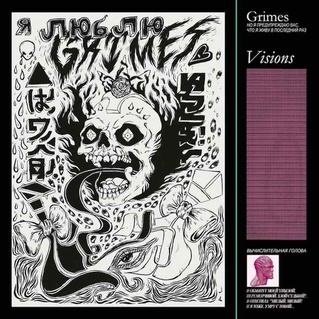Jack Barnett of These New Puritans said a brilliant thing last year. Discussing the band’s previous plans to follow up Hidden with a more accessible album, he told NME, "I’ve sort of abandoned that idea. I’ve realised I actually hate pop music. Most people don’t actually like good music, so there’s no point in doing something for them."
The tip at least of Jack’s tongue was in cheek there, but it was as refreshing as a cold face-dunk to hear someone break the poptimist diktat. I almost wince when I hear the p-word now; it’s become such a received mantra, an over-analytic but underthought dogma, where not only is pop seen as the highest ideal, but critics (yes, most definitely myself included, before you get Google-happy) have bent themselves into terrible shapes to describe the thorniest noise as ‘essentially pop music’. The word becomes both twisted beyond any clear meaning and a clunking cliche at the same time.
Canadian electronic craftswoman Claire Boucher sits in an shifty place in a world where underground artists never stop bloody banging on about Aaliyah, and Beyonce and Rihanna sit on top of the pop pantheon with their golden calves clad in the emperor’s new hotpants. One finger in the witch house pie, another in hipster R&B, another delicately tracing the gothy, ambient history of her label 4AD, another finger-clicking to TLC… happily admitting to "no sense of consistency in anything I do"; unpindownable is very much her steez. Yet there’s also a solid punk DIY ethic at work in her post-internet sonic safari that extends further than that hand-drawn, weirdy artwork – watching her juggle between knobs, sliders, microphones and keys live while gamely attempting to dance in between, you’re tempted to step in and ask if she wants you to hold something. It makes for a less smooth live experience than a Zola Jesus show, for example, but it’s in many ways more impressive.
And while Boucher may be undeniably a half-haircutted hipster, a wacky sailor of cock-a-leekie houseboats with a weakness for dickhead fashion shoots, but she’s also very much the real deal in terms of music nerdery – you’d have to be to pull of the brittle Oriental courtship dance of ‘Saurdaukar Levenbrech’ from Geidi Primes or the dark incantations of ‘Weregild’ on Halfaxa and make them sound so convincing. Wide-ranging though her sound is, though, it always sounds rooted as well as eerily airy and on Visions she seems to have put those roots down in the sweet spot between hipster pop, pop-pop and underground music, a place so pure-sounding that you just don’t have to worry about where it sits in the scheme of things, any more than Boucher clearly does.
For all its sophistication there’s a bracing innocence to Visions. Intro track ‘Infinite [heart symbol] Without Fulfilment’ has a playground skippiness like a childhood rhyme, and ‘Genesis’ too knocks the threat of po-face out of its new-agey chorale with at pat-a-cake lightness. It’s the same sort of young, wild charm that graced the Cocteau Twins’ best moments (not that we’re suggesting Boucher’s been cribbing from ‘Treasure’ by torchlight in the months of dark confinement in her room that produced Visions – she’s prone to slapping down inept influence-spotters on Twitter). ‘Oblivion’, offsets an ominous circling synth with a doo-wopping Dion-style "wah-wah-wah-wah-wah" and when Boucher promises "See you in the dark night", it doesn’t sound like a threat; she’s skipping off to play in the black, with no fear. ‘Colour Of Moonlight’ featuring VHS-loop artist and lablemates Doldrums takes the brutal shunts of ‘When Doves Cry’ and makes them a thing of porcelain delicacy, Boucher’s pure, silvery voice like Princess Mononoke howling at the moon. The sassy ‘Circumnambient’ is a pouting, hair-flicking bit of android hipster R&B with a burbling synth, stuttering, fluttering vocals and climactic beatery. ‘Vowels = Space And Time’ is even sassier, like Vanity swapping lingerie for spacesuits and drifting off in a stellar cloud made of trilling falsettos, whoop-whoop synths and handclaps.
It’s ‘Be A Body’, though, that’s the sexiest moment, Boucher’s detached-cherubim vocals and stabs of synth descending into an earthier chorus with distorted parping and hefty beats that provide a welcome contrast to the album’s more ethereal moments.
Visions is a more focused album than the spaced-out Halfaxa or the disparate Geidi Primes but one of the key charms of Grimes’ sound is its unforcedness. It doesn’t sound like it’s striving or straining to be pop music, or conversely that it’s determined to be awkward – it’s just going where pleasure leads it. It’s also warm and natural sounding in comparison to the witch house crew with whom Boucher shares sonic genes. If something like ‘Hallways’ on Halfaxa was colder and more industrial, Visions fuses those textures more completely with the global, ancient, ur-folk feel that marked Geidi Primes, putting her in the tradition of the likes of Dead Can Dance as well as that of Salem. It also has the silvery melodic lightness of Lykke Li, of whom Boucher is a fan, and on the likes of ‘Nightmusic’ and ‘Eight’, a rearing robotic thing that’s the album’s hardest moment, has that ghost-trapped-in-the-machine vibe that Crystal Castles and The Knife nail at their saddest.
With so much going on, it could lose its way, but instead Visions has a sort of timelessness to it. The purest, most beautiful moment is ‘Skin’, a bareboned Prince-via-Burial-via Julee Cruise ballad where Boucher’s breathes in her ether-light falsetto "you touch me within / And so I thought I could be human once again", showing off a Carey-esque melismatic trill, offset by a chanted, pulsing chorus. It’s a heart-stopping moment, and testimony to the power of what you can do when you just please yourself. Is that pop music, then? Honestly, who bloody cares.


